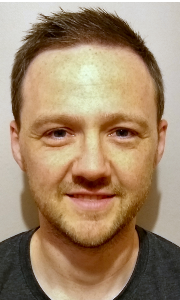Paul Niven, who lives with type 1 diabetes, attended our professional conference as a guest blogger. He shares his thoughts on diabetes tech, artificial intelligence and the future of diabetes care.

My biggest take away from attending this year’s Diabetes UK Professional Conference (DUKPC) is admiration for how much work and effort our dedicated healthcare professionals (HCPs) and researchers do behind the scenes to keep improving care for people living with all types of diabetes.
I’d always been curious to find out what HCPs talk about at this conference, so I was excited to be able to attend as a guest blogger and find out. I quickly realised why this event is for HCPs due to how complex some of the information being presented was. It was expert HCPs doing cutting edge research and presenting their clinical findings to their expert peers to help improve outcomes for everyone living with diabetes.
It was clear from the opening plenary session how good our current diabetes care is, with the National Diabetes Audit (a survey that looks at how well diabetes healthcare is doing against national standards) showing the best results since records began. This year also marked 100 years since insulin was first successfully used to treat diabetes, and a theme in many of the sessions was looking to the past, the present and the future to see just how far we’ve come.
Two important announcements were made during the week. The first was the new recommendations that everyone living with type 1 diabetes should be offered access to Flash glucose monitoring or continuous glucose monitoring (CGM). The second was the results of the Flash UK Trial, which showed it to be both cost effective (compared to finger prick testing) for the NHS and to improve diabetes management and quality of life for those on the trial.
Artificial intelligence (AI) and diabetes tech
I’m a huge fan of technology. It plays such an important role in the treatment of diabetes, so I was keen to hear about all the latest advances as well as the challenges that technology creates. One of my favourite sessions focused on AI and digital technology, discussing how much data people with diabetes create - from our glucose levels, smart insulin pens and insulin pumps to other wearable devices like fitness trackers capturing our activity, exercise and sleep data. Unfortunately, much of this data is kept in separate systems, which makes it challenging for HCPs to use because they often have to log in to multiple platforms and can’t see all the data in one place. But it was encouraging to hear the work being done to convince manufacturers to open up access to this data. This could create opportunities for AI to analyse the combined data on a large scale, which could be used in future apps, like smarter bolus calculators.
“Minding the gap” with diabetes tech
This phrase came up in several of the technology sessions as a reminder that access to technology should be for the many, not for the few. Statistics showed that people from minority ethnic or socially deprived backgrounds have less chance of accessing technology, so it’s important that actions are taken to close this gap. Another gap discussed was the specialist skillset required by HCPs to support people with diabetes who are using these new technologies.
Retinal imaging and type 2 medicines
In another talk, I was interested to hear how AI is being used in the analysis of diabetes retinal screening images to better predict who is likely to develop eye problems in the future. The AI identified the signs of different stages of eye problems and could predict possible future issues up to three years in advance, which could help prioritise people who need to be seen more urgently and be cost saving for the NHS.
Another use for AI discussed at the conference was to help HCPs select the best medicine combinations for people living with type 2 diabetes. With so many new medications available, and each having their own advantages and disadvantages, AI can help HCPs choose the best treatment for each individual patient by analysing their health information and showing the different possible health outcomes for each medicine combination.
Hope for the future
By the end of the week, I had a much greater appreciation for all the fantastic research being done by our HCPs, as well as the challenges and pressures they face daily when providing diabetes care. The last decade has seen some amazing advances in our understanding and treatment of all types of diabetes and my hope for the future is greater access to diabetes tech like Flash and CGM, as well as hybrid or fully closed loop systems to be available for those who want to use them.
About me
I’m Paul (@NiVZ), I’ve been living with type 1 diabetes for 25 years. I live with my wife and three children in Aberdeenshire, Scotland. I love technology and gadgets, tweeting about my diabetes, playing guitar, and enjoy going to local cafes for coffee and cakes.
Read more from our DUKPC guest bloggers
"Let's keep talking about hard things" - Laura's experience at DUKPC
